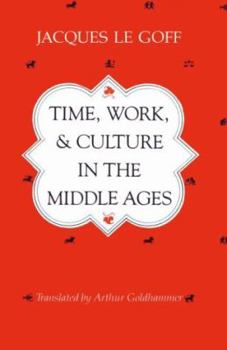Time, Work, and Culture in the Middle Ages
Select Format
Select Condition 
Book Overview
Jacques Le Goff is a prominent figure in the tradition of French medieval scholarship, profoundly influenced by the Annales school, notably, Bloch, Febvre, and Braudel, and by the ethnographers and anthropologists Mauss, Dum zil, and L vi-Strauss. In building his argument for "another Middle Ages" (un autre moyen ge), Le Goff documents the emergence of the collective mentalit from many sources with scholarship both imaginative...
Format:Paperback
Language:English
ISBN:0226470814
ISBN13:9780226470818
Release Date:February 1982
Publisher:University of Chicago Press
Length:400 Pages
Weight:1.15 lbs.
Dimensions:0.9" x 5.9" x 9.0"
Customer Reviews
1 rating
The rise of oratores, bellatores, and laboratores....
Published by Thriftbooks.com User , 23 years ago
For a number of years, historians of various backgrounds have attempted to conceptually and operationally define the "Middle Ages." In 'Time, Work, and Culture in the Middle Ages' Jacques Le Goff, a top French Historian outlines his perspective via a collection of essays he developed on this subject over several years. Le Goff suggests the modern historian should use the techniques of the ethnographer, the findings of archeologists, and the records of courts, commerce, and confessor's manuals to construct the everyday world of the inhabitants of Europe during the Middle Ages. He says he is not going to try to turn the Dark Ages into the Golden Ages, and he is not operating without a theory since that is virtually impossible--in spite of the claims to the contrary by some modern theorists. As he mentions the 'division of labor' in several contexts, I imagine he is following social theories outlined by 20th Century French historians such as Durkheim, Mauss, and Bloch. Le Goff sets about untangling a story he says began with the fall of the Roman Empire and ended with the Industrial Age ('Longue duree' of Fernand Braudel). He seems to view the Renaissance and Reformation as the natural culmination of forces that arose during the Middle Ages: the division of labor and the division of time.Le Goff says much evidence suggests a tripartite society arose in the 900s and gained ascendency by the 1200s. This society was composed of: oratores (clergy), bellatores (warriors), and laboratores (workers). Fortunately or unfortunately, the division of society did not end with three groups. He says the Middle Ages involved two major processes: the division of labor and the division of time, and that these two processes were inseparable. Le Goff spends much time discussing the laboratores and how their work day, which was once measured as sun-up to sun-down (God's time as depicted in the "Book of Months") came to be measured and paid in hourly rates as the result of the growing power of commercial interests. The land-based wealth of the feudal lords and their peasant farmer tenants was subverted by commercial practices that ultimately exploited and alienated the artisan workers. These alienated workers later grew in power and became involved in peasant revolutions and other disruptive activities. The sections of Le Goff's essays that most fascinated me described the rise of church power at the expense of the "old" religion of the common people. During the Middle Ages, the Church acquired enormous power. The clergy (oratores) were mostly monastics and penitents to begin with, but with the rise of commerce and trade, many of them became mendicants and secular scholars. These scholars lay the groundwork for the reformation and renaissance. But before the church splintered into the hundreds of protestant groups that came into existence following the reformation, it managed to subdue many of the common folk beliefs. Of pa





